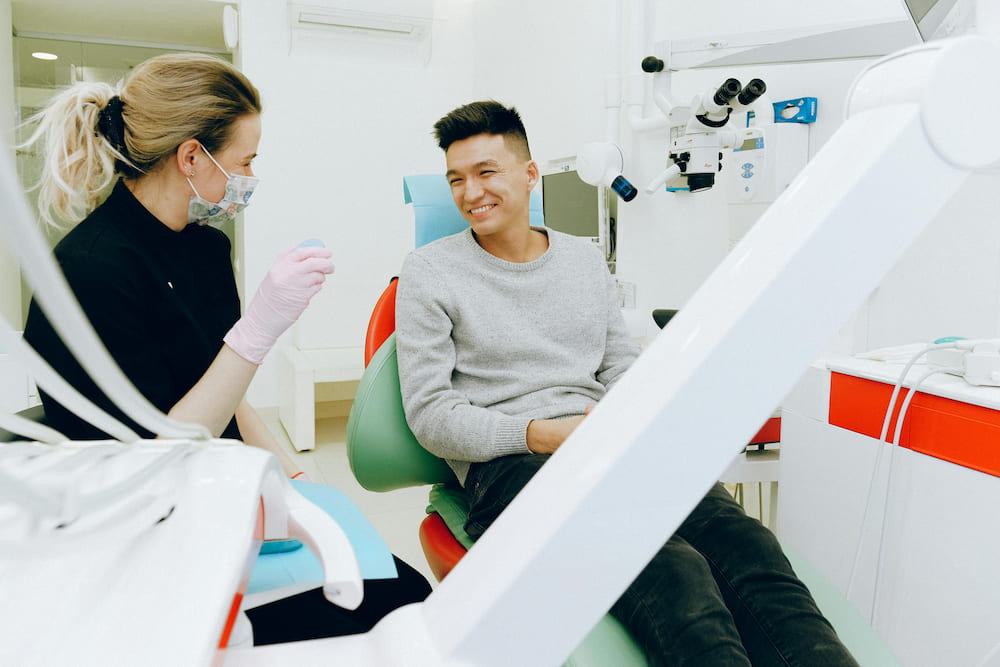Beautiful teeth make a lasting impression. Yet, not everybody has teeth to make them wish to smile, no wonder cosmetic procedures such as dental veneers are increasing in popularity.
Previously known as a temporary treatment solely available to move stars, veneer materials and techniques have now evolved than ever before. They have become more affordable and more durable, making them a solution to various teeth imperfections, such as discolored teeth, gappy or crooked teeth, broken or chipped teeth, and small or oddly shaped teeth.
Basically, a dental veneer is a thin layer of porcelain or composite resin that acts as a lid over the front and edge of the tooth. Veneers are like false fingernails in shape and can be utilized for either aesthetic or physical purposes.
However, irrespective of your reason for having dental veneers, there are essential things you need to know before getting them, which we are going to look into in this article.
What are Porcelain Veneers?
Porcelain veneers are thin and custom-made shells of tooth-colored porcelain which are usually bonded to the front surface of your teeth. As earlier mentioned, veneers can be used to correct various dental concerns, as well as to improve the appearance of your smile.
Porcelain veneers are often regarded as one of the most successful cosmetic dentistry treatments that can be found today and can last for several years with appropriate care. Nevertheless, veneers are not suitable for all patients or all situations. Hence, it is essential to consult with an experienced cosmetic dentist to confirm if they are appropriate for you.
6 Things You Need to Know Before Getting Porcelain Veneers
Getting Veneers is Irreversible
In the procedure for dental veneers, your dentist will have to eliminate a little portion of the enamel, and sometimes, it is vital to trim the tooth so as to change its natural shape. Consequently, veneers cannot be removed in the absence of a real replacement.
It is not Painful
Concerning the removal of enamel and tooth trimming, you may be curious to know about any possible pain you may experience during the process. Interestingly, similar to every dental treatment, your dentist is expected to use a local anesthetic before the removal of the enamel.
In certain cases, even nitrous oxide, or laughing gas, being a safe and effective sedative, can be used for increased numbness. Hence, you will not experience any pain during the procedure.
To apply the veneers, a microscopic piece of the tooth is often eliminated. Besides, your gum is expected to be altered around the tooth that has gone through the process. Consequently, for some days or weeks, you may feel a little gum sensitivity and pain. Yet, the pain is not severe, and you will be able to cope with it by using over-the-counter painkillers such as ibuprofen. After some days, the pain will then subside.
Temporary Veneers Should be Used Before the Permanent One
During the placement of veneers, customizations are usually made in order to meet the needs and tastes of the patient. For this reason, your dentist will design temporary veneers that will be joined to your tooth with a temporary bonding cement.
You will need to bear those temporary veneers for some weeks. During that period, you can examine if anything is wrong with your veneers or how your smile looks. With the new perception, you will then consult with your dentist and have the final, permanent veneers modified to match your taste.
Veneers is not for Everyone
Due to the fact that only a little portion of the tooth is often eliminated during the placement of dental veneer and it is glued to your natural tooth, it is seen as one of the least invasive cosmetic processes. However, certain diseases and habits can prevent getting veneers.
For example, grinding and clenching the teeth may result in cracked veneers. As a result, dental veneers for those with those habits will not be a suitable idea. Moreover, there are certain gum-related infections and diseases which can interfere with veneers and the recovery of the gum after their application.
Ensure you keep these factors in mind and consult your dentist to talk about those issues, as he or she may have a more appropriate alternative to suggest, according to your precise circumstances.
Veneers Need Time to Bond to Your Teeth
After the application of your porcelain veneers, it is crucial to give time for the veneers to bond to your natural teeth. During this period, ensure you abstain from chewing on or biting down hard items that place pressure on your teeth, such as chewing on ice, biting nails, or opening bottles.
Regarding brushing your teeth, make sure a soft-bristled toothbrush is used with a toothpaste recommended by your dentist.
Quality Porcelain Veneers Require Multiple Appointments

The process for porcelain veneers is spread over several appointments which is vital to make sure that you are content with the outcome. During your first appointment, your dentist will likely take X-rays, and an impression of your bite, as well as come up with a wax-based mock set of veneers for you to review.
During the second appointment, the thickness of your teeth could get slightly minimized to develop space in your mouth for the veneers. A second mold of your teeth is then come up with and temporary plastic veneers will be fitted over your teeth to copy the look and feel of the veneers.
Following your customized porcelain veneers being produced in a specialized laboratory, your third appointment will then involve a full teeth clean, veneer application, coupled with polish for a natural appearance.
Porcelain Veneers

Through the modification of the shape/size of the tooth and whitening, veneers can be used to have a more beautiful smile.
However, since dental veneers can have a significant impact on your confidence, smile, and entire health, it is crucial to visit a professional dentist who can deliver quality results.
With a full understanding of veneers and the cosmetic process involving their placement, you will be able to make a wise decision about undergoing a dental veneer process.
Written by:
Wohlers Family Dentistry
3733 Canton Rd, Marietta, GA 30066
+17709269914
Did you find this helpful? Check out our other helpful articles on our website.
Read Also
- The Role of Ingredients in Your Skincare: What to Look ForSkincare works best when you understand what goes into the products you use daily. Ingredients form the foundation of every formula and determine how the skin reacts over time. Each cream, cleanser, or serum has its own role, determined by its ingredients. Learning what to look for helps you pick products that help skin and… Read more: The Role of Ingredients in Your Skincare: What to Look For
- Your Guide to Finding a Trusted DentistChoosing the right dentist in Sandgate or your area is crucial for maintaining good oral health and achieving a confident smile. With countless dental practices to choose from, patients may find the task daunting. Data from the American Dental Association indicates that there are over 200,000 practicing dentists in the United States, highlighting the importance… Read more: Your Guide to Finding a Trusted Dentist
- Achieving a Defined, Balanced Facial Contour in SingaporeA well-defined jawline and a gently tapered lower face — commonly referred to as a V-shaped face — is a look many people aspire to. In Singapore’s beauty and aesthetic scene, treatments that help refine facial contours have grown in popularity as more individuals seek subtle, natural enhancements that boost confidence and balance facial features.… Read more: Achieving a Defined, Balanced Facial Contour in Singapore
- The Wellness Blueprint: How Your DNA Holds the AnswerGenetic testing is revolutionizing preventive healthcare by offering insights into individual health risks. By analyzing DNA, these tests provide a personalized health blueprint that can guide lifestyle and medical decisions. This approach, often referred to as DNA wellness testing, helps to optimize health naturally and prevent potential diseases. In recent years, genetic testing has become… Read more: The Wellness Blueprint: How Your DNA Holds the Answer
- Exploring the Benefits of Infusion Therapy in OKC: The Ultimate GuideUnderstanding Infusion Therapy: A Deep Dive into Its Purpose and Process What exactly is Infusion Therapy? Infusion therapy is an advanced medical treatment that delivers medication and nutrients directly into the bloodstream through a vein, typically via an IV (intravenous) line. This method is particularly beneficial for patients who require a concentrated dose of medication,… Read more: Exploring the Benefits of Infusion Therapy in OKC: The Ultimate Guide
- Ketamine-Assisted Therapies: Impacts on Employee WellbeingWorkplace stress is common today. Many employees feel tired, anxious, or burned out. Regular therapy can help, but some people need more support. Ketamine-assisted therapy is showing good results for mental health. A ketamine-assisted therapist guides each session safely. This therapy can improve mood, focus, and energy. Learning more about it can help teams stay… Read more: Ketamine-Assisted Therapies: Impacts on Employee Wellbeing
- The Future of Men’s Health: Why Telehealth Is Here to StayTelehealth isn’t just a pandemic trend that faded into the background. For Australian men, it has become one of the most practical, time-saving, and stress-free ways to manage everyday health — and it’s shaping the future of how we access care. Platforms like DOCTO, an Australian online doctor and specialist telehealth service, are leading the… Read more: The Future of Men’s Health: Why Telehealth Is Here to Stay
- How to Build a Simple, Clean Skincare Routine ?You don’t need a complicated skincare routine. It doesn’t have to be something that requires twenty different products and confusing steps. Your routine works well with just a few high-quality clean ingredients. The beauty industry keeps pushing more products, but your skin actually needs less. You only need a simple approach to get better results… Read more: How to Build a Simple, Clean Skincare Routine ?









